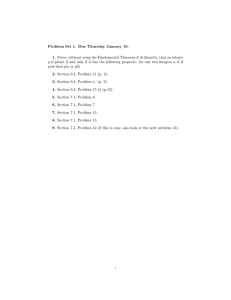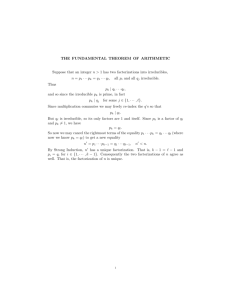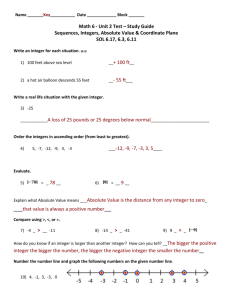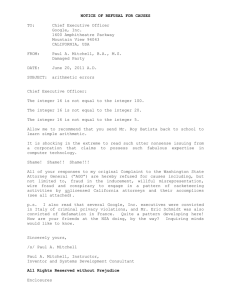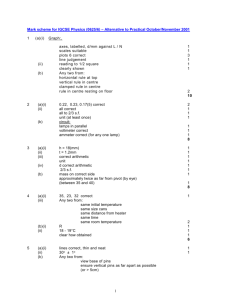Math 342, Spring Term 2009 Pre-Midterm Sheet Material February 8, 2009
advertisement
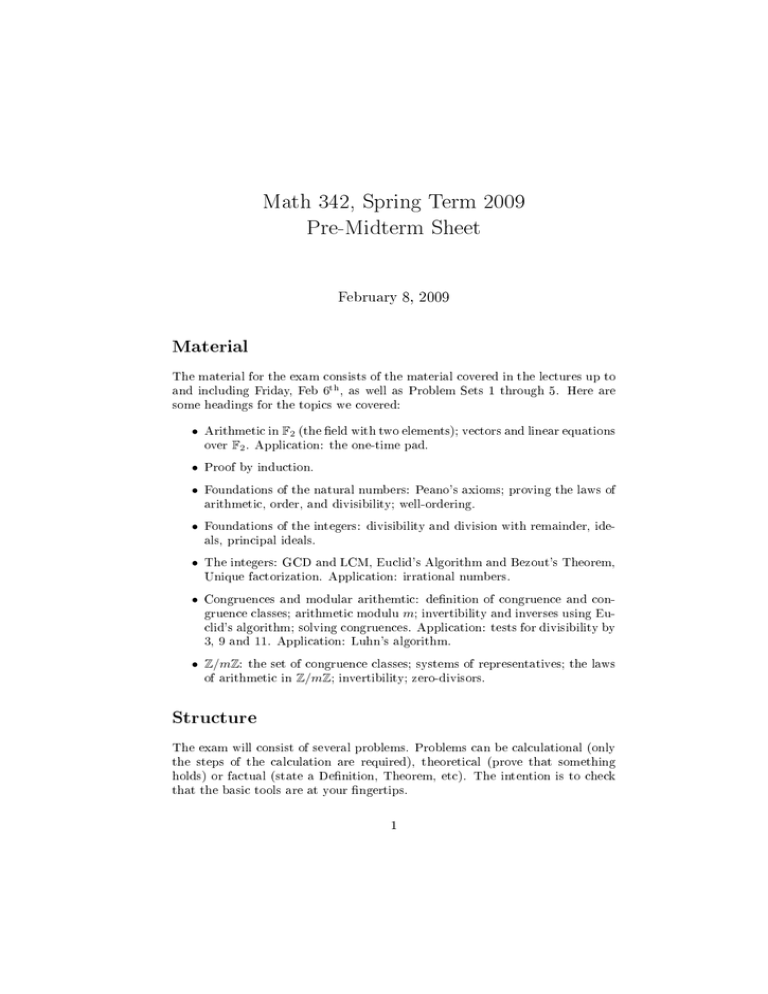
Math 342, Spring Term 2009
Pre-Midterm Sheet
February 8, 2009
Material
The material for the exam consists of the material covered in the lectures up to
and including Friday, Feb
6th ,
as well as Problem Sets 1 through 5. Here are
some headings for the topics we covered:
•
Arithmetic in
over
F2 .
F2 (the eld with two elements); vectors and linear equations
Application: the one-time pad.
•
Proof by induction.
•
Foundations of the natural numbers: Peano's axioms; proving the laws of
arithmetic, order, and divisibility; well-ordering.
•
Foundations of the integers: divisibility and division with remainder, ideals, principal ideals.
•
The integers: GCD and LCM, Euclid's Algorithm and Bezout's Theorem,
Unique factorization. Application: irrational numbers.
•
Congruences and modular arithemtic: denition of congruence and congruence classes; arithmetic modulu
m;
invertibility and inverses using Eu-
clid's algorithm; solving congruences. Application: tests for divisibility by
3, 9
and
• Z/mZ:
11.
Application: Luhn's algorithm.
the set of congruence classes; systems of representatives; the laws
of arithmetic in
Z/mZ;
invertibility; zero-divisors.
Structure
The exam will consist of several problems. Problems can be calculational (only
the steps of the calculation are required), theoretical (prove that something
holds) or factual (state a Denition, Theorem, etc). The intention is to check
that the basic tools are at your ngertips.
1
Sample paper
1. (Unique factorization)
(a) [calculational] Write
148
as a product of prime numbers.
(b) [factual] State the Theorem on unique factorization of natural numbers.
(c) [theoretical] Prove that every natural number can be written as a
product of irreducibles.
2. Solve the following system of equations in
x + y + z
[2]5 x + y − z
[3]5 x + z
3. Prove by induction that
an =
Z/5Z:
= [4]5
= [2]5
= [1]5
n(n+1)
is an integer for all
2
4. (modular arithmetic)
(a) State the denition of a zero-divisor modulu
(b) What are the zero-divisors in
Z/15Z?
(c) How many non-zero-divisors are there in
2
m.
Z/15Z?
n ≥ 0.
Solutions
1. (Unique factorization0
(a)
148 = 2 · 74 = 2 · 2 · 37.
(b) Every natural number
product
n=
Qd
i=1 pi
n≥1
can be written as a (possibly empty)
of prime numbers, uniquely up to the order of
the factors. or For every natural number
{e }
,
Q p p prime
n = p pep .
natural numbers
such that
(c) Let
S
n 6= 0
there exist unique
all but nitely many of which are zero,
be the set of natural numbers which are non-zero and which
cannot be written as a (possibly empty) product of irrreducible numbers. If
S
is non-empty then by the well-ordering principle it has a
n ∈ S.
n were irreducible, it would be equal to a prod1 (itself ), so n must be reducible, that is
of the form n = ab with 1 < a, b < n. But then a, b ∈
/ S (since n was
minimal). It follows that both a and b are products of irreducibles,
Qd
Qe
Qd
Qe
say a =
i=1 pi and b =
j=1 qj . In that case, n =
i=1 pi ·
j=1 qj
displays n as a product of irreducibles, a contradiction. It follows
that S is empty, that is that every non-zero integer is a product of
least element
If
uct of irreducibles of length
irreducibles.
(x, y, z) be a solution to the system. Adding the rst two equations we
[5]5 x + y = [3]5 . Since 5 ≡ 0 (5) this reads y = [3]5 . Subtracting
the rst equation from the third gives: [2]5 x − y = [−3]5 , that is [2]5 x =
y − [3]5 = [0]5 . Since 2 is invertible modulu 5, we nd x = [0]5 . Finally,
from the last equation we read z = [1]5 . Thus, the only possible solution
is x = [0]5 , y = [3]5 , z = [1]5 . We now check that this is, indeed a solution:
0 + 3 + 1 = 4 ≡ 4 (5), 2 · 0 + 3 − 1 = 2 ≡ 2 (5) and 3 · 0 + 1 = 1 ≡ 1 (5) as
2. Let
see that
required.
n = 0 we have an = 0 which is an integer. Continuing by induction,
− n(n+1)
= (n+1)
· ((n + 2) − n) =
an+1 − an = (n+1)(n+2)
2
2
2
n+1
·
2
=
n
+
1
. Asusming, by induction, that an is an integer then shows
2
that an+1 = an + (n + 1) is an integer as well.
3. When
we note that
4. (zero-divisors)
a is a zero-divisor modulu m if there exists b, b 6≡ 0 (m),
ab ≡ 0 (m) or a residue class x ∈ Z/mZ is a zero-divisor if
exists y ∈ Z/mZ, y 6= [0]m , so that xy = [0]m .
(a) A number
so that
there
(b) The zero-divisors are
(c) There are
7
[0]15 , [3]15 , [5]15 , [6]15 , [9]15 , [10]15 , [12]15 .
zer0-divisors hence
3
8 = 15 − 7
non-zero-divisors.
